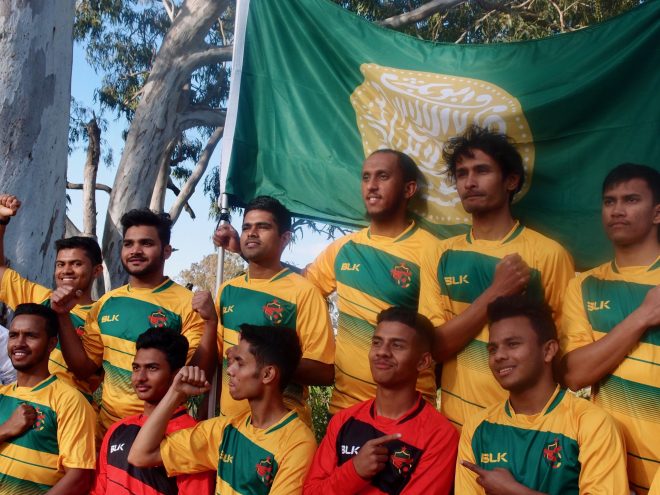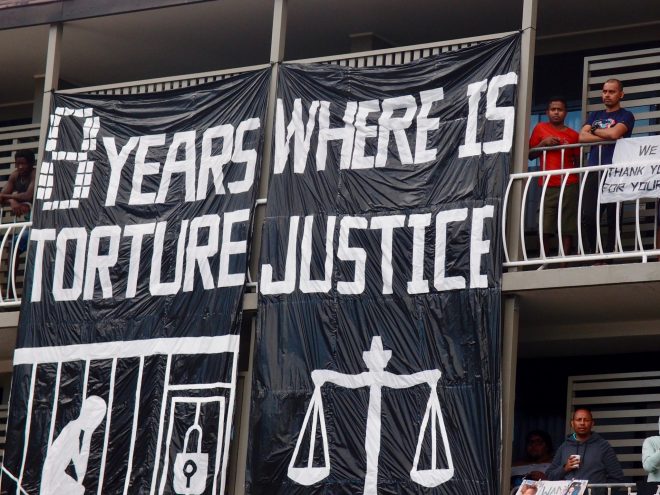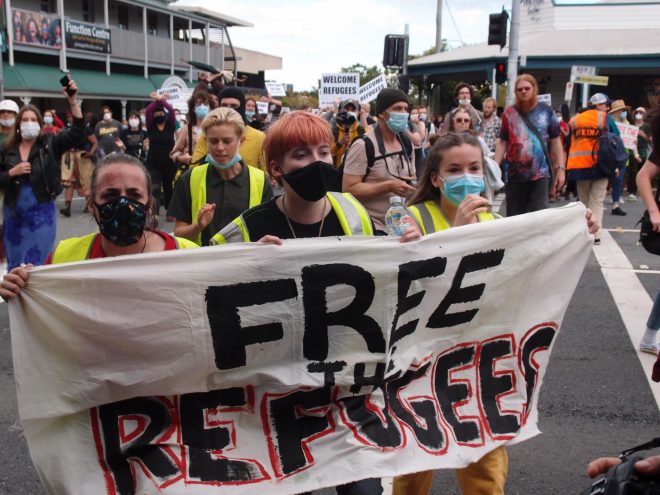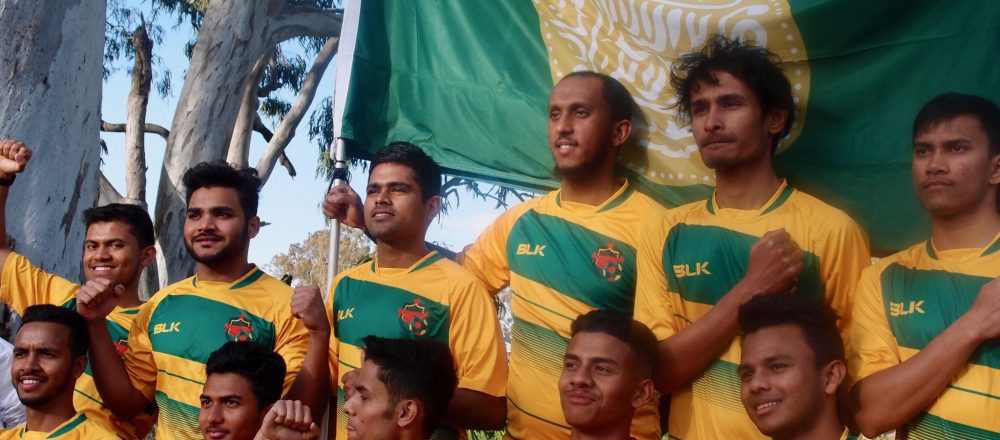Three years after violence in Myanmar forced more than 745,000 Rohingya Muslims to flee the country, many in Australia are still suffering the consequences of statelessness.
On the soccer field, Kamal Sawyed and his teammates from the Rohingya United Club in Brisbane, look like your average adolescent squad.
Off the field, the 24-year-old IT student faces frequent reminders of the second-class citizenship that forced him to flee his home in Myanmar when he was fifteen.
“Are you a citizen? What country are you from? Stateless isn’t on the list,” said Kamal, recounting an earlier conversation with a bank teller.
The youngest of eight children, Kamal was born in Gu Dar Pyin, a village in Myanmar’s Rakhine State. There, up to 400 people were massacred in the days that followed the August 2017 Burmese military ‘clearance operation’ which forced more than 745,000 Rohingya Muslims to flee to Bangladesh.

His brother, the only one from his family left in the village during the attack, fled to Bangladesh with a gunshot wound to his hip.
Kamal applied for Australian citizenship more than three years ago with the hope of being reunited with his family.
As a Rohingya, Kamal is disqualified from Myanmar citizenship, and remains stateless while he waits for his application to be approved.
In the meantime, he is too afraid to go abroad to see his mother and, because she is undocumented, has no way of bringing her here legally.
“People ask why we haven’t brought our family here, but it’s not as easy for us – we don’t have documentation or passports,” he said.
Australia imposed sanctions on five Myanmar military generals in 2018, after a report by a UN fact-finding mission found that war crimes, crimes against humanity and likely genocide had occurred in Rakhine state in August 2017.
According to the UN, the atrocities occurred with a “backdrop of persecution affecting the Rohingya from birth to death,” tied to their lack of legal status and citizenship.
The Rohingya community in Australia commemorated the third anniversary of the violence virtually at the end of August, due to coronavirus restrictions.
They say that while they are among the more fortunate, many still suffer from lack of permanent legal status or citizenship.
The Burmese Rohingya Community in Australia — a not-for-profit that provides Rohingya verification cards for new arrivals — estimates that there are around 3,500 Rohingya in Australia.
Mohammad Junaid, a spokesperson for the organisation, said that their legal status depends on when and how they arrived in Australia and most have little certainty on when they will be reunited with their families.
“Most Rohingya who arrived here left their parents, partners and kids behind. They went ahead, with the hope of bringing them to Australia later. However, it hasn’t turned out that way,” said Junaid.
Kamal arrived on Christmas Island in June 2012 and is amongst the last group of people seeking asylum by boat to be eligible for permanent residency in Australia.
Soon after, a policy was introduced, which has barred people who are seeking asylum by boat from permanent protection. They are now only eligible for temporary humanitarian visas and many languish in offshore detention.
The years he spent attending high school in Brisbane are a far cry from the detention centre on Nauru where 23-year-old Abdul Sattar grew up.
Abdul arrived in Australia by boat on 24 July 2013, a week after the offshore detention policy begun.

His parents arranged for him to leave their home in Rakhine state after dozens were killed and thousands of homes burnt in the escalating conflict between Buddhist and Muslim residents.
“I didn’t even know what Australia was back then, I’d never heard of it. But I was told that in Australia your human rights will be respected, and you can live as a free person,” said Abdul via phone, with help from an interpreter.
“When we arrived, we were taken by a navy boat to Christmas Island. I made friends with other young people there, but after a while, we were randomly separated and sent to Manus Island or Nauru,” he said.
Seven years later, Abdul has spent more than a third of his life in detention on the small island nation of roughly 12,000 people, which the UN Refugee Agency (UNHCR) has long said is unsuitable for refugee settlement.
“I spent six years in my room” he said. “I was scared. We were always under violent threats.”
A year ago, Abdul was brought to Brisbane for medical treatment under the now repealed medevac laws.
He is amongst more than 100 refugee and asylum seeker men detained at Brisbane’s Kangaroo Point hotel.
It is the closest Abdul has come to the Australian community.
From the balcony, which faces a main road, he can see pedestrians, a pub and people eating dinner at a fish and chips shop. But he isn’t allowed to go downstairs to the garden or out on to the street.
“Inside you can’t move, you can’t go out. They say they are putting us in expensive accommodation but for us it’s just another prison cell.” he said.
The hotel has been at the centre of recent protests and arrests since a guard inside the hotel tested positive for coronavirus and activists set up a 24-hour blockade demanding the men be released into the community for their safety.

Abdul says he spends his days worrying about his family who have been living in a refugee camp in Cox’s Bazar since August 2017.
“I can’t support my family in the camps – my mum is unwell, but I can’t help her.”
But after so many years in detention, he says he can no longer console them when they ask when he will be released.
“The fact is that I don’t know, so the question I would like to ask the people of Australia is: ‘When am I going to be released? And what is my crime?’”
Abdul is one of 47 stateless people held in immigration detention facilities in Australia.
The UNHCR in Australia told Right Now via email that they regularly meet with those who have been medically evacuated to the mainland from harsh conditions in Nauru and Papua New Guinea.
“Many are experiencing heightened levels of anxiety and depression surrounding their situation in Australia, whether as a result of their re-detention, access to medical treatment, duration and conditions of detention, family separation, or uncertainties surrounding processes and timeframes for release and durable solutions,” said the spokesperson.
“The long-term, arbitrary detention of any refugee or asylum-seeker is not only inappropriate, it’s also contrary to international human rights principles and law.”
“For stateless persons, equal nationality rights are the only solution.”
Serajul Islam is another member of the Rohingya United soccer team. He wishes he could join the protests.
“They are living inside. I’m living outside. I want to go and support them, but I’m afraid I’ll lose my visa and they’ll send me back to the camps,” said the 24-year-old.
Serajul spent the first sixteen years of his life in refugee camps in Bangladesh before embarking on an eight-month journey to reach Australia in late 2012.
“People were leaving to Malaysia … I was growing up and started to realise things: ‘What am I going to do in the future? I can’t have kids here, marry here, there’s no life here’,” said Serajul, who now has a baby on the way.
When he arrived in Australia he was placed on a bridging visa before receiving a three-year temporary protection visa, which disqualifies him from bringing family members to Australia.
Serajul says his current visa expired over a year ago, in turn stripping him of his right to apply to travel overseas to see his family once COVID-19 restrictions are lifted.
“I get angry but what can I do? Just wait. I want to get permanent residence, I want to travel, go see my people and help them however I can. But I can’t travel, I don’t have the right.”
For now, he sends them every penny he can save from the factory where he works driving a forklift.
“I’m happy here, thanks to Australian government, but feel sad for families back there. The way I’m living life, and them there, nothing compares,” he said.
UNHCR told Right Now that refugees in the country should be entitled to basic standards of treatment, including the right to live with their families.
“Family separation leads to hardship and sometimes has tragic consequences. It may also create serious obstacles to a refugee’s integration in a new country,” said the spokesperson.
For Kamal, who plans to study IT at university next year, the future is more secure. Still, like Serajul and Abdul, he lives with the uncertainty of not knowing when he will see his family again.
“I can’t plan with my family, just because we don’t have that one thing – citizenship,” he said.


